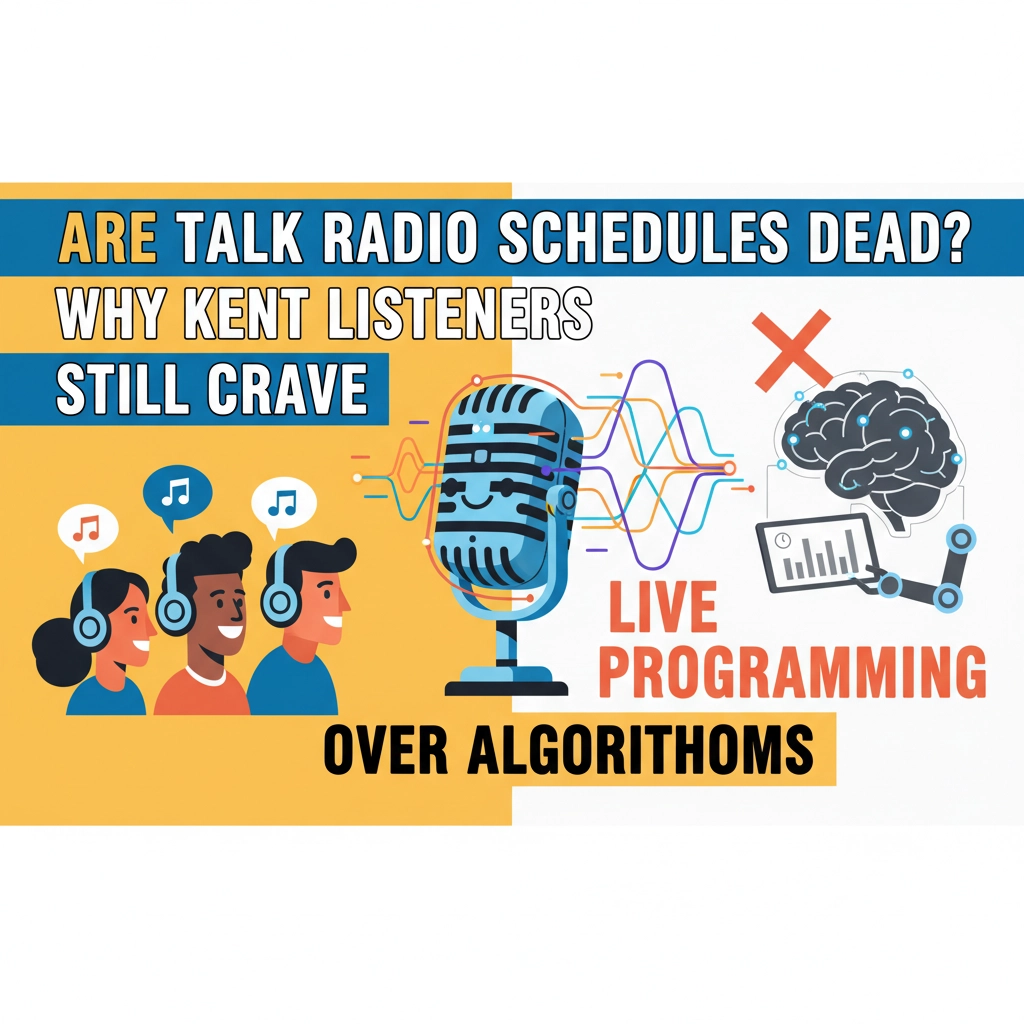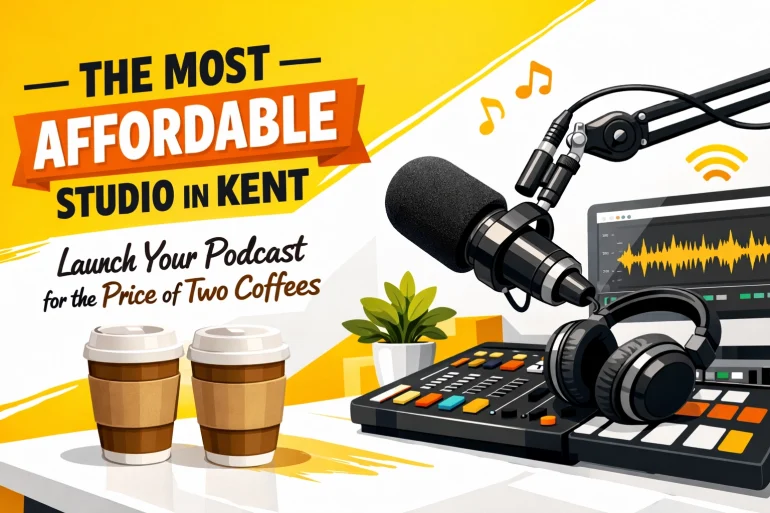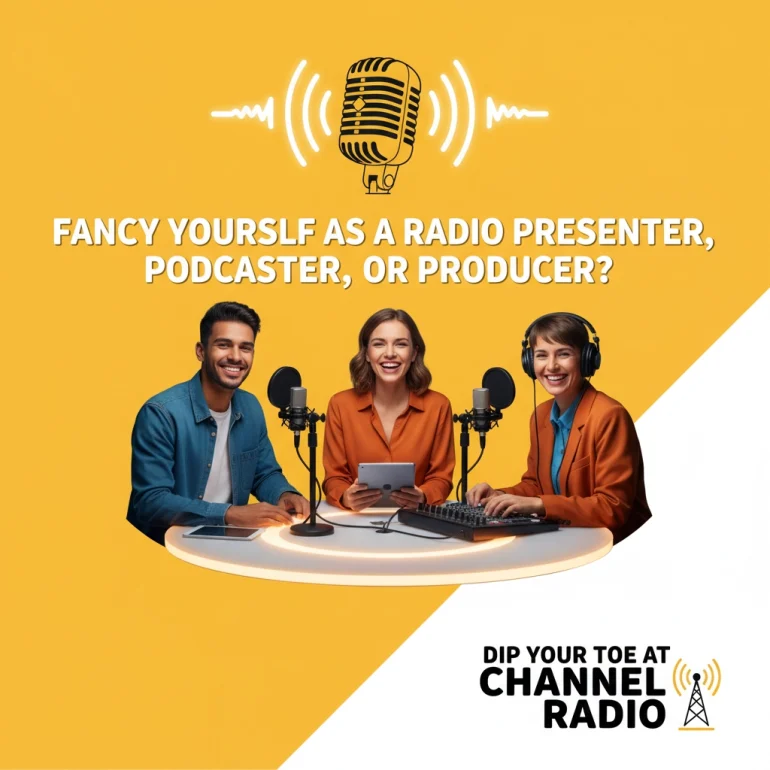-
 play_arrow
play_arrowChannel Player Channel Radio Web Player
Are Talk Radio Schedules Dead? Why Kent Listeners Still Crave Live Programming Over Algorithms
today20/10/2025 7

If you think talk radio schedules are dead, you're looking at the wrong data. While tech evangelists keep preaching the gospel of algorithmic audio, Kent listeners are voting with their ears: and they're choosing live, scheduled programming over sterile streaming recommendations. Here's what you need to understand: the human connection that live radio provides isn't just surviving the digital revolution, it's thriving because of it.
Let's face it: you've been fed a lie about radio's demise. The numbers tell a completely different story, and if you're not paying attention to what's actually happening in Kent's audio landscape, you're missing one of the biggest opportunities in local media.
The Data Destroys the Algorithm Myth
AM/FM radio commands a crushing 68% share of ad-supported audio time among adults 18 and older. Meanwhile, podcasts struggle at 20%, and ad-supported Spotify gasps for air at a measly 5%. These aren't declining numbers from some golden age of radio: this is 2025 data that proves scheduled programming isn't just alive, it's dominating.
In Kent specifically, you need to see what's really happening. kmfm reaches 191,000 listeners weekly, generating 1.12 million listening hours. Heart Kent leads with 251,000 weekly listeners, while BBC Radio Kent maintains a solid 136,000 listeners. Here's the kicker: kmfm alone grew by 4,000 listeners this year. That's growth, not decline.
Spring 2025 data shows total U.S. AM/FM radio audiences up 6%. Among Hispanic 25-54 audiences, night and weekend listening surged with double-digit increases. Black 25-54 audiences saw night listening jump 12.2%. If talk radio schedules were dead, would you be seeing growth like this?

Why Your Algorithm Can't Replace Human Curation
Here's what Spotify's algorithm will never understand about you: you're not a data point to be analyzed: you're a human being craving connection. When you tune into live talk radio, you're not just consuming content; you're joining a conversation with someone who understands your community, your concerns, and your daily reality.
Imagine this scenario: you're driving to work, and breaking news affects your route. Your algorithmic playlist keeps playing the same pre-selected tracks while live radio immediately pivots to give you real-time traffic updates, weather alerts, and community discussions about what's happening right now. Which serves you better: predictable algorithms or responsive humans?
Kent listeners choose live programming because presenters actively work to broaden their horizons rather than trap them in echo chambers. Your streaming service learns your habits and feeds them back to you in increasingly narrow loops. Live radio challenges you, surprises you, and introduces you to perspectives you didn't know you needed.
Don't get me wrong: algorithms have their place. But when 85% of adults aged 25-64 tune into radio weekly, and these levels have remained rock-solid for three years, you need to acknowledge that human curation offers something algorithms simply cannot replicate.
The Power of Scheduled Anticipation
If you think on-demand is always better than scheduled, you're missing the psychology of anticipation. Talk radio schedules create relationships between listeners and hosts that streaming can never match. You develop routines around specific shows because you value the live, unfolding nature of real conversation.
Think about your favorite talk show. You tune in at the same time because you know the host will be discussing current events, taking calls, and responding to what's happening in your community right now. That's not content consumption: that's participation in a shared experience.
Car listening proves this point perfectly. AM/FM radio dominates in-car listening with an 85% share of ad-supported audio. Why? Because when you're commuting, you want current information, traffic updates, and timely discussions: not static playlists that ignore what's happening outside your windshield.

Building Communities, Not Just Audiences
Local talk radio stations in Kent aren't just broadcasting: they're building communities around shared interests and genuine concerns. When listeners call into their local station to request dedications, share perspectives, or hear their names acknowledged on air, they're participating in something fundamentally more human than clicking "like" on a playlist.
Here's what streaming platforms will never offer: hyperlocal focus that gives voice to issues affecting your daily life. Channel Radio and other Kent stations create space for residents to engage with topics that matter to their specific community. This isn't scalable to global platforms optimized for mass markets: and that's exactly why it's valuable.
The growth in spoken word programming since the pandemic reflects your hunger for human connection during isolation. Talk radio satisfied this need by offering voices, conversations, and personalities that made you feel less alone. Even as restrictions lifted, this preference for human-curated, conversational audio persisted because it addresses something deeper than mere content consumption.
The Business Opportunity You're Ignoring
If you're a local business in Kent and you're not advertising on talk radio, you're missing your target audience where they actually are. While agencies consistently underestimate AM/FM radio shares and overestimate streaming audiences, smart businesses recognize the reality: scheduled talk programming delivers engaged, local audiences that streaming services struggle to match.
Here's your competitive advantage: talk radio listeners are more engaged, more loyal, and more likely to take action on advertising messages because they trust the personalities delivering those messages. When a respected local talk show host recommends your business, that's not just an ad: it's an endorsement from a trusted community voice.

Channel Radio offers businesses exactly this opportunity. Our talk programming builds the kind of listener relationships that turn advertising into authentic recommendations. When you sponsor segments or advertise during our shows, you're not interrupting content: you're becoming part of a conversation with engaged Kent listeners who value local businesses.
What This Means for Your Media Strategy
Stop chasing shiny digital objects and start focusing on proven, growing audiences. Talk radio schedules aren't dead: they're more vital than ever because they offer something increasingly rare in our digital world: genuine human connection and local relevance.
If you're a business owner, recognize that the perception gap between radio's actual dominance and its perceived relevance creates an opportunity. While your competitors chase expensive digital advertising with questionable engagement, you can build real relationships with Kent listeners through trusted local voices.
If you're a content creator or aspiring broadcaster, understand that live, scheduled programming offers career opportunities that pre-recorded, algorithmic content cannot match. The human element: real personalities, immediate interaction, and shared cultural context: creates connections that audiences crave more than ever.

Your Next Steps
Don't let conventional wisdom about streaming's dominance blind you to radio's continued strength. The numbers are clear: AM/FM radio dominates ad-supported audio, talk programming is growing, and local stations like those serving Kent continue building engaged, loyal audiences.
For businesses: investigate advertising opportunities with local talk radio stations. The engaged audiences, local focus, and trusted personalities offer marketing value that algorithmic targeting cannot replicate.
For listeners: recognize that your preference for live, scheduled programming puts you in the majority, not the minority. You're not behind the times: you're ahead of algorithms that can never replace human insight and community connection.
Channel Radio continues proving that talk radio schedules aren't dead: they're essential. Our programming creates the kind of listener relationships and community engagement that streaming services spend billions trying to replicate. And we're just getting started.
The question isn't whether talk radio schedules are dead. The question is whether you'll recognize their continued power before your competition does.
Written by: Terry Jones





